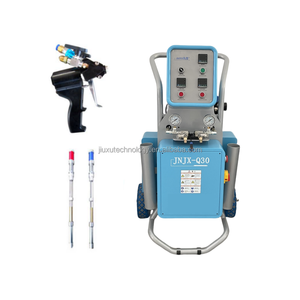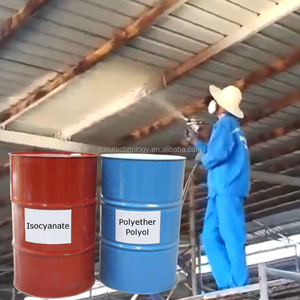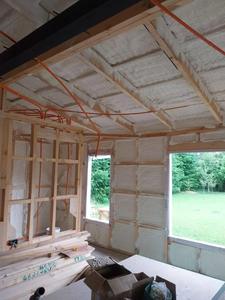(1062 products available)










































































































































































































Polyurethane spray foam insulation kits are used to insulate and protect different areas in residential and commercial buildings. Each of these kits comes with unique components, applications, and characteristics. The following are the types of polyurethane spray foam insulation kits:
Closed Cell Polyurethane Spray Foam Insulation Kits
This kit has a higher R-value of about 6.5 per inch. Its closed-cell structure provides excellent thermal resistance and creates a vapor barrier. This makes it the best choice for areas prone to moisture, such as basements and roofs. Its rigidity offers structural support and enhances the insulation of existing walls. It is suitable for applications where insulation and vapor barriers are required, like conditioned crawl spaces and exterior walls.
Open Cell Polyurethane Spray Foam Insulation Kits
It has a lower R-value of about 3.5 to 4.0 per inch. The open-cell structure allows air to circulate, making it more permeable to moisture and air. This kit is lighter and softer than closed-cell foam, providing sound attenuation properties. It is primarily used for interior applications like walls, ceilings, and attics. This insulation kit is cost-effective and enhances energy efficiency by reducing air leaks. It is ideal for soundproofing and thermal insulation in non-hazardous areas.
Professional-Grade Spray Foam Kits
These kits are designed for professional contractors. They come with advanced technology and higher performance characteristics. They have a higher R-value than open and closed-cell kits. They offer superior adhesion, thermal resistance, and structural integrity. They are equipped with heated hoses, precision nozzles, and pressure control systems. This ensures consistent application and excellent results. Professional-grade kits are suitable for large-scale commercial and industrial projects. They require specialized equipment and technical expertise.
DIY Spray Foam Kits
These kits are designed for homeowners who want to do it themselves. They are easy to use and come with instructions for precise application. They provide a more cost-effective solution than professional-grade kits. They are ideal for small-scale projects like sealing air leaks and insulating small cavities. They are available in open-cell and closed-cell formulations. They offer varying R-values and are suitable for different applications.
R-Value Perfection:
The foam's R-value, which measures how well it insulates, rises to 6.5 per inch for closed-cell spray foam and 5.2 for open-cell foam. This high R-value means buildings stay cooler and cozier in extreme temperatures. Homes and businesses need to use less energy to control the climate, which is good for the planet.
Sealing Off Air Leaks:
The primary reason for using foam insulation is to stop air leaks. The foam expands to fill cracks, gaps, and holes in walls, roofs, and foundations. This seals off any openings, so air can't travel in and out. Buildings then have better air seals, which keeps the temperature controlled space comfy. The seals also lower energy bills by reducing the need for heating and cooling. Homes and offices stay warm or cool without losing air through leaks.
Moisture Management:
Closed-cell spray foam has water-blocking powers. It creates a moisture barrier that stops condensation, rain, and humidity from coming inside. This is important for preventing mold, mildew, and rot in damp areas like basements and crawl spaces. The foam keeps structures dry and sound, even in wet climates.
Strengthening Spaces:
Closed-cell foam insulation also adds structural support. As it hardens, it bonds with materials like wood and metal. This makes roofs and walls more durable and able to withstand severe weather. The added strength prolongs building lifespans and lowers maintenance needs.
Convenience and Control:
Spray foam kits offer simple, precise application. Each kit has what workers need to spray foam at the right amounts and pressures. They control how much expands and hardens. The nozzles allow targeting of tight spaces and complex shapes. Users apply just the right foam where required for an even insulation layer.
Mobility and Readiness:
These kits are portable. They come ready to use in different locations, whether on a job site or in a truck. Professionals don't need bulky machines or extra supplies. Everything fits in a box to be transported and applied anywhere.
Polyurethane spray foam insulation kits are widely used in the construction and home improvement industries. It is ideal for insulating and sealing air spaces in residential and commercial buildings. The following are some common usage scenarios:
New Construction Projects
When building new homes or commercial spaces, a polyurethane spray foam insulation kit can be used. This helps to create a high-performance thermal envelope. The foam expands to fill in cracks, gaps, and seams. This prevents air leakage and creates a barrier against environmental conditions. This ensures that the buildings maintain consistent interior temperatures. It also minimizes the need for heating and cooling systems. This reduces utility bills and promotes energy efficiency.
Renovation and Retrofitting
Home and building owners looking to improve their existing insulation systems opt for spray foam insulation kits. These kits are suitable for retrofitting projects. This is because the spray foam adheres to most surfaces and expands to fill gaps. It is also effective in sealing air leaks around windows, doors, and plumbing fixtures. This helps to improve overall insulation and air quality. It also prevents condensation and mold growth.
Attics and Roofs
Attics, roofs, and crawl spaces are critical areas in a building that require proper insulation. A polyurethane spray foam insulation kit is ideal for these applications. The closed-cell foam creates a durable and water-resistant barrier. It protects the building from structural damage caused by moisture and stagnant water. Proper insulation of these areas prevents heat loss through the roof and attic. This is particularly important in colder climates where retaining heat is necessary.
Commercial Buildings
From warehouses to retail stores and office spaces, commercial buildings benefit greatly from spray foam insulation. The kits provide a quick and efficient way to insulate large surface areas. This minimizes disruptions during the application process. The foam's high R-value per inch ensures that commercial spaces are insulated optimally. This allows for the effective operation of refrigeration units in food storage facilities.
Mobile Structures
Another common usage scenario of polyurethane spray foam insulation kits is in mobile structures. These include; trailers, boats, and tiny houses. The foam insulation adds structural integrity while providing lightweight insulation. Its ability to adhere to surfaces makes it ideal for use in vehicles and mobile homes.
Open-cell vs. closed-cell foam
Understanding the difference between open-cell and closed-cell polyurethane foam is important. Open-cell foam is lighter, cheaper, and a better sound insulator. It is suitable for walls, ceilings, and roof decks in temperate climates. Closed-cell foam is denser, providing excellent insulation and moisture and air barrier. It is suitable for areas with extreme temperatures, high humidity, and coastal regions. Consider the climate and specific insulation needs to choose the right foam type.
R-value
The R-value measures insulation foam's effectiveness at resisting heat flow. A higher R-value indicates better insulation. Closed-cell foam has a higher R-value per inch than open-cell foam. When choosing a kit, look for products with a high R-value suitable for the intended space and climate zone. Consider the available space for application and desired insulation level when considering R-values.
Kit size
The size of the kits varies, from 600 board feet to 2000 board feet. A bigger kit yields more foam, suitable for larger projects. In contrast, a smaller kit is ideal for small spaces like crawl spaces and small repairs. Estimate the square footage and board feet needed for the project to determine the right kit size. Always order a little extra to account for foam loss during application.
Ease of use
Consider the ease of use of the polyurethane spray foam insulation kit. Look for kits with detailed instructions, a user-friendly design, and minimal equipment requirements if DIY. For professional use, choose high-performance kits with advanced features and technical support. Read reviews and compare options based on your skill level and project size.
Brand reputation
Research the manufacturers and read reviews to understand the brand's reputation. Choose brands known for quality products, excellent customer support, and reliable certifications. For professional projects, select industry-leading brands with extensive experience and positive testimonials. This ensures the project's success and long-lasting results.
Q1: What is a polyurethane spray foam insulation kit?
A1: A polyurethane spray foam insulation kit consists of two chemicals: A and B. It also consists of essential accessories like an applicator gun, safety equipment, and others. When mixed and sprayed, they expand to form insulation foam, sealing gaps and sticking to surfaces.
Q2: What are the benefits of using a polyurethane spray foam insulation kit?
A2: The benefits include enhanced insulation, reduced energy costs, and a quick application process. It also includes air sealing, moisture barrier, and adhesive properties.
Q3: What are the different types of polyurethane spray foam insulation kits?
A3: There are two main types - closed-cell and open-cell spray foam insulation. The former has a higher R-value and is used in exterior applications, while the latter is lighter, less expensive, and suitable for interior applications.
Q4: How should one store a polyurethane spray foam insulation kit?
A4: Store in a cool, dry place away from direct sunlight and heat sources. Ensure canisters are upright and stable to prevent leaks. Follow manufacturer guidelines for optimal storage practices.
Q5: Are there any safety precautions when using a polyurethane spray foam insulation kit?
A5: Yes, safety precautions include using protective gear like gloves, goggles, and masks. Work in well-ventilated areas and use appropriate clothing. Follow manufacturer instructions carefully to ensure safety while applying the foam insulation kit.